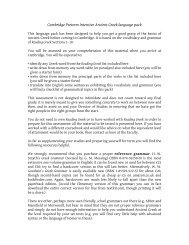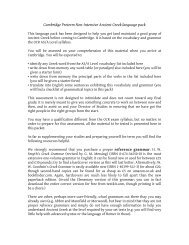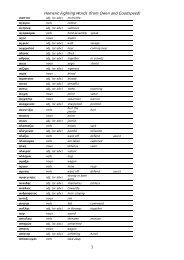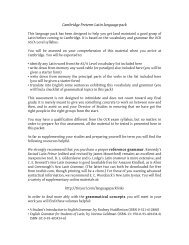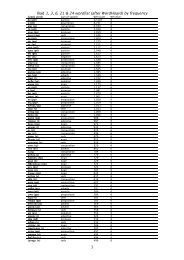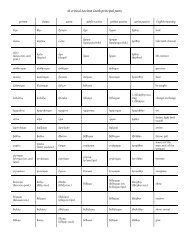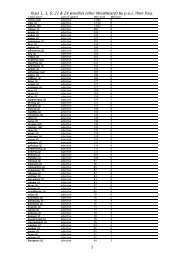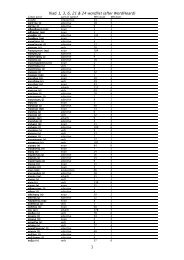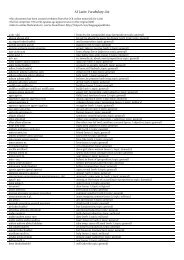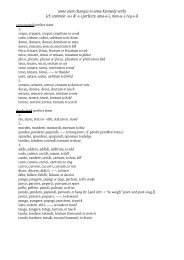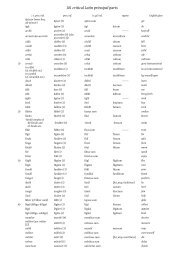<strong>Lexicon</strong> <strong>for</strong> <strong>Iliad</strong> 1, 3, 6, <strong>21</strong> & <strong>24</strong> (<strong>draft</strong>) Il.;meta\ fresi/n Il. • to complete a number, with, besides, pe/mptos meta\ toi=sin a fifth with them, Hom.;—N. B., meta/ is never used with dat. sg., unless of collective Nouns, meta\ stratw=| Il. • WITH ACCUS., • of motion, into the middle of coming among a number, meta\ fu=la qew=n Hom.; meta\ lao *)axaiw=n Il. • in pursuit or quest of, bh=nai meta\ *ne/stora Il.; in hostile sense.bh=nai meta/ tina to go after, pursue him, Il.;—also, bh=nai meta\ patro\s a)kouh/n to go in search of news of thy father, Od.;po/lemon me/ta qwrh/ssonto they were arming <strong>for</strong> the battle, Il. • of mere sequence or succession, • of Place, after, next after, behind, laoi\ e(/ponq' w(sei\ meta\ kti/lon e(/speto mh=la as sheep follow after the bell-wether, Il. • of Time, after, next to, meq' *(/ektora po/tmos e(toi=mos after Hector thy death is at the door, Il.;meta\ tau=ta thereupon, thereafter, Attic;meq' h(me/ran in the course of the day, Hdt. • of Worth, Rank, next to, next after, following a Sup., ka/llistos a)nh met' a)mu/mona *phlei/wna Il. • after, according to, meta\ so kai\ e)mo kh=r as you and I wish, Il.;met' u)/lmon by the line of the furrow, Il. • generally, among, between, as with dat., meta\ pa/ntas a)/ristos best among all, Il.;meta\ xei=ras e)/xein Hdt. • absol. as ADV. among them, with them, Il. • and then, next afterwards, thereafter, Hom., Hdt. • me/ta <strong>for</strong>me/testi, Od., etc. • IN COMPOS: • of community or participation, asmetadi/dwmi, mete/xw, c. gen. rei. • of action in common with another, asmetadai/numai, c. dat. pers. • of an interval, asmetai/xmion. • of succession, asmetado/rpios. • of pursuit, asmete/rxomai. • of letting go, asmeqi/hmi. • after, behind, asmeta/frenon. • back again, reversely, asmetatre/pw, metastre/fw. • most often of change of place, condition, plan, etc., asmetabai/nw, metabouleu/w, etc. µετασευοµαι epicmetasseu/omai • 3rd sg. epic aor2 mete/ssu^to • Pass.:— to rush towards or after, Il.:— c. acc. to rush upon, mete/ssuto poime/na law=n Il. µετατρεποµαι 3rd sg. aor2met-etra/peto • Mid., to turn oneself round, turn round, Il. • to look back to, shew regard <strong>for</strong>, c. gen., Il. µεταυδαω imperf.met-hu/dwn • to speak among others, to address them, c. dat. pl., Hom. • c. acc. pers. to accost, address, Mosch. µεταφηµι imperf.met-e/fhn • (cf.metei=pon) • to speak among others, to address them, c. dat. pl., Hom. • c. acc. pers. to accost, Il. µεταφραζω fut.sw • to paraphrase, to translate, Plut. • Mid. to consider after, tau=ta metafraso/mesqa kai\ au)=tis Il. µετειµι (ei)mi/ sum) • to be among, c. dat. pl., Hom.; absol., ou) pauswlh\ mete/ssetai no interval of rest will be mine, Il. • impers., me/testi/ moi/ tinos I have a share in or claim to a thing, Hdt., Attic:—so part. neut. used absol., ou)de *ai)oleu=si meteo th=s xw/rhs since the Aeolians had no share in the land, Hdt. • sometimes the share is added in nom., me/testi pa=si to\ i)/son Thuc.;e)moi\ tou/twn ou)de m. Plat. µετειµι Attic fut. ofmete/rxomai • imperf.meth/|ein • epic aor1 part.meteisa/menos • to go between or among others, Il. • to go after or behind, follow, Il., Xen. • c. acc. to go after, go in quest of, pursue, Hdt., Attic • to pursue with vengeance, Aesch., Thuc.;di/kas m. tina (wheredi/kas is acc. cogn.), to execute judgment upon one, Aesch. • to pursue, go about a business, Eur. • m. tina\ qusi/ais to approach one with sacrifices, Hdt.: c. acc. et inf., e(/na e(/kaston meth/|esan mh\ e)pitre/pein besought each one not to permit, Thuc. • to pass over to another, Ar. µετειπον epic met-e/eipon • (serving as aor2 ofmeta/fhmi) • to speak among others address them, c. dat. pl., Hom. • absol. to speak thereafter, afterwards, Hom. µετερχοµαι aeolic and doric ped-e/rxomai • fut.meteleu/somai • (in Attic, the imperf. and fut. are borrowed fromme/teimi, q. v.) • aor2met-h=lqon • perf.-elh/luqa • to come or go among others, c. dat. pl. or absol., Hom.;metelqw/n having gone between the ranks, Il. • to go to another place, Il.: simply to come next, follow, Pind. • c. acc. to go after, to go to seek, go in quest of Il., Attic: generally, to seek <strong>for</strong>, aim at, Eur., Thuc. • in hostile sense, to pursue, Il., Hdt., Attic: c. acc. rei, to seek to avenge, Aesch., Eur.:—then c. dupl. acc. pers. et rei, m. ti tina/to visit a crime upon a person, Eur. • of things, to go after, attend to, to pursue a business, Hom., Attic • adire, prosequi, tina Hdt., Eur.: to court or woo, Pind. µετοπισθε of Place, from behind, backwards, back, Hom., Hes. • of Time, after, afterwards, Hom. • prep. with gen. behind, Hom. µετοχλιζω fut.i/sw • 3rd sg. epic aor1 opt.metoxli/sseie • to remove by a lever, hoist a heavy body out of the way, Od. • to push back the bar, Il. µετωπον me/t-wpon, ou, to/, • (
<strong>Lexicon</strong> <strong>for</strong> <strong>Iliad</strong> 1, 3, 6, <strong>21</strong> & <strong>24</strong> (<strong>draft</strong>) <strong>for</strong>i)/wmen) Il.;mh\ pa/qwmen Xen. • with Opt. to express a wish that a thing may not happen, a(\ mh\ krai/noi tu/xh which may <strong>for</strong>tune not bring to pass, Aesch.:—also in wishes that refer to past time and there<strong>for</strong>e cannot be fulfilled, mh/ pot' w)/felon lipei=n Soph. • in vows and oaths, where ou) might be expected, i)/stw *zeu\s mh\ me toi=s i(/ppoisin a)nh e)poxh/setai a)/llos Zeus be my witness, not another man shall ride on these horses, Il.;ma\ th *)afrodi/thn, mh\ e)gw/ s' a)fh/sw Ar. • with Inf., used as Imperat., mh\ dh/ moi a)po/proqen i)sxe/men i(/ppous Il. • In DEPENDENT clauses: • ne, Il., Attic:— mh/ often stands alone= i(/na mh/, Hom., Attic • nisi, Hom., etc.;—so, o(/te mh/ = ei) mh/; etc. • in relat. clauses, when they imply a condition or supposition, le/gonq' a(\ mh\ dei= such things as one ought not, Soph.;lo/gois toiou/tois oi(=s su\ mh\ te/ryei klu/wn Soph. • with Inf., always except when the Inf. represents Ind. or Opt., as in oratio obliqua. • with Participle, when it can be resolved into a conditional clause, mh\ a)penei/kas = ei) mh\ a)ph/neike Hdt.;mh\ qe/lwn = ei) mh\ qe/leis, Aesch.; so in a general sense, di/daske/ m' w(s mh\ ei)do/ta = ut qui nihil sciam, Soph. • with abstract Nouns as with Partic., ta\ mh\ di/kaia = a(\ a) mh\ h)=| di/kaia, Aesch.;to\ mh\ kalo/n Soph.;h( mh\ 'mpeiri/a = to\ mh\ e)/xein e)mpeiri/an, want of experience, Ar. • after Verbs expressing fear or apprehension (cf.mh\ ou)): • when the thing feared is fut., with pres. Subj., I fear he may persuade thee, Il. • with Opt. <strong>for</strong> Subj., according to the sequence of moods and tenses, Hom., etc. • when the action is present or past, the Ind. is used, fobou/meqa mh\ h(marth/kamen we fear we have made a mistake, Thuc. • without a Verb to express hesitation, perhaps, mh\ a)groiko/teron h)=| to\ a)lhqe\s ei)pei=n Plat. • In QUESTIONS: • Direct questions, • nonne?a)=r' ou) te/qnhke; surely he is dead, is he not?a)=ra mh\ te/qnhke; surely he is not dead, is he?:—whenou) andmh/ appear in consecutive clauses, each negat. retains its proper <strong>for</strong>ce, ou) si=g' a)ne/cei mhde\ deili/an a)rei=s; will you not be silent, and will you be cowardly? i. e. be silent and be not cowardly, Soph. • with the Subj., when the answer is somewhat doubtful, mh\ ou(/tw fw=men; can we say so? Plat.:—so also with Opt. anda)/n, pw=s a)/n tis mh\ le/goi; how can a man help speaking? Plat. • indirect questions withmh/ belong in fact tomh/ with Verbs of fear and apprehension, periskopw= mh/ pou/ tis e)gxri/mpth| Soph. µηρα mh=ra, wn, ta/, • = mhri/a, Il., Ar.) µηρια (
- Page 1 and 2:
Lexicon for Iliad 1, 3, 6, 21 & 24
- Page 3 and 4:
Lexicon for Iliad 1, 3, 6, 21 & 24
- Page 5 and 6:
Lexicon for Iliad 1, 3, 6, 21 & 24
- Page 7 and 8:
Lexicon for Iliad 1, 3, 6, 21 & 24
- Page 9 and 10:
Lexicon for Iliad 1, 3, 6, 21 & 24
- Page 11 and 12:
Lexicon for Iliad 1, 3, 6, 21 & 24
- Page 13 and 14:
Lexicon for Iliad 1, 3, 6, 21 & 24
- Page 15 and 16:
Lexicon for Iliad 1, 3, 6, 21 & 24
- Page 17 and 18:
Lexicon for Iliad 1, 3, 6, 21 & 24
- Page 19 and 20: Lexicon for Iliad 1, 3, 6, 21 & 24
- Page 21 and 22: Lexicon for Iliad 1, 3, 6, 21 & 24
- Page 23 and 24: Lexicon for Iliad 1, 3, 6, 21 & 24
- Page 25 and 26: Lexicon for Iliad 1, 3, 6, 21 & 24
- Page 27 and 28: Lexicon for Iliad 1, 3, 6, 21 & 24
- Page 29 and 30: Lexicon for Iliad 1, 3, 6, 21 & 24
- Page 31 and 32: Lexicon for Iliad 1, 3, 6, 21 & 24
- Page 33 and 34: Lexicon for Iliad 1, 3, 6, 21 & 24
- Page 35 and 36: Lexicon for Iliad 1, 3, 6, 21 & 24
- Page 37 and 38: Lexicon for Iliad 1, 3, 6, 21 & 24
- Page 39 and 40: Lexicon for Iliad 1, 3, 6, 21 & 24
- Page 41 and 42: Lexicon for Iliad 1, 3, 6, 21 & 24
- Page 43 and 44: Lexicon for Iliad 1, 3, 6, 21 & 24
- Page 45 and 46: Lexicon for Iliad 1, 3, 6, 21 & 24
- Page 47 and 48: Lexicon for Iliad 1, 3, 6, 21 & 24
- Page 49 and 50: Lexicon for Iliad 1, 3, 6, 21 & 24
- Page 51 and 52: Lexicon for Iliad 1, 3, 6, 21 & 24
- Page 53 and 54: Lexicon for Iliad 1, 3, 6, 21 & 24
- Page 55 and 56: Lexicon for Iliad 1, 3, 6, 21 & 24
- Page 57 and 58: Lexicon for Iliad 1, 3, 6, 21 & 24
- Page 59 and 60: Lexicon for Iliad 1, 3, 6, 21 & 24
- Page 61 and 62: Lexicon for Iliad 1, 3, 6, 21 & 24
- Page 63 and 64: Lexicon for Iliad 1, 3, 6, 21 & 24
- Page 65 and 66: Lexicon for Iliad 1, 3, 6, 21 & 24
- Page 67 and 68: Lexicon for Iliad 1, 3, 6, 21 & 24
- Page 69: Lexicon for Iliad 1, 3, 6, 21 & 24
- Page 73 and 74: Lexicon for Iliad 1, 3, 6, 21 & 24
- Page 75 and 76: Lexicon for Iliad 1, 3, 6, 21 & 24
- Page 77 and 78: Lexicon for Iliad 1, 3, 6, 21 & 24
- Page 79 and 80: Lexicon for Iliad 1, 3, 6, 21 & 24
- Page 81 and 82: Lexicon for Iliad 1, 3, 6, 21 & 24
- Page 83 and 84: Lexicon for Iliad 1, 3, 6, 21 & 24
- Page 85 and 86: Lexicon for Iliad 1, 3, 6, 21 & 24
- Page 87 and 88: Lexicon for Iliad 1, 3, 6, 21 & 24
- Page 89 and 90: Lexicon for Iliad 1, 3, 6, 21 & 24
- Page 91 and 92: Lexicon for Iliad 1, 3, 6, 21 & 24
- Page 93 and 94: Lexicon for Iliad 1, 3, 6, 21 & 24
- Page 95 and 96: Lexicon for Iliad 1, 3, 6, 21 & 24
- Page 97 and 98: Lexicon for Iliad 1, 3, 6, 21 & 24
- Page 99 and 100: Lexicon for Iliad 1, 3, 6, 21 & 24
- Page 101 and 102: Lexicon for Iliad 1, 3, 6, 21 & 24
- Page 103 and 104: Lexicon for Iliad 1, 3, 6, 21 & 24
- Page 105 and 106: Lexicon for Iliad 1, 3, 6, 21 & 24
- Page 107 and 108: Lexicon for Iliad 1, 3, 6, 21 & 24
- Page 109 and 110: Lexicon for Iliad 1, 3, 6, 21 & 24
- Page 111 and 112: Lexicon for Iliad 1, 3, 6, 21 & 24
- Page 113 and 114: Lexicon for Iliad 1, 3, 6, 21 & 24
- Page 115 and 116: Lexicon for Iliad 1, 3, 6, 21 & 24
- Page 117 and 118: Lexicon for Iliad 1, 3, 6, 21 & 24
- Page 119 and 120: Lexicon for Iliad 1, 3, 6, 21 & 24
- Page 121 and 122:
Lexicon for Iliad 1, 3, 6, 21 & 24
- Page 123 and 124:
Lexicon for Iliad 1, 3, 6, 21 & 24
- Page 125 and 126:
Lexicon for Iliad 1, 3, 6, 21 & 24


